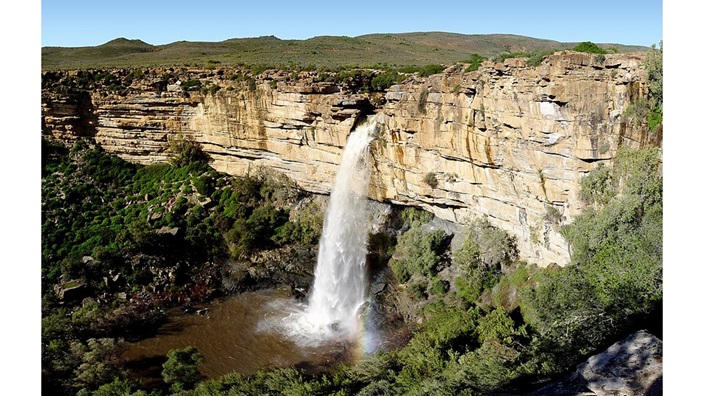Swimming to the Waterfall at Uvongo
In the heat of the early winter
By the haunts of the southern strand.
Filled with a lust for adventure
We forwent the safety of land.
But the cliffs watched on with suspicion,
In silence they warned us and said:
“Beware of the pools at Uvongo
They’re marked with the work of the dead!”
But we paid the voice no bother
And took no heed of its call.
We swam in the pools at Uvongo
And made for the waterfall.
The push of the current was horrid
The surface was mirky and black.
The sun and the sky beat on us
The water was salty and brack.
But something below was rising
Shouting in malice and fear.
We swam above without a clue
Too young we were to hear.
Something grabbed hold of my ankle
Something wrapped over my feet.
Something was pulling me under
Into the jaws of defeat.
My body was filled with water
I thrashed with the might of the sea.
Yet deeper I sank each moment
And nothing could break me free.
I heard in the bowels of the cavern
As I struggled to hold my breath:
“Beware of the pools at Uvongo
They’re marked with the curse of death!”
On Reading the Romantic Poets
Much have I read in the midnight hours.
Poring ever through those golden pages
chasing whispers from the long dead sages.
How could one resist such pleasant powers?
Those thirsty eyes, drunk on the rolling lines
stagger onward and stumble on the way.
I sit as the aged Jew, blind and grey—
whose crooked finger reads the prophet’s rhymes.
Or like the Magi consulting the stars
to chart a course across the burning sea.
How softly fall those weighty words on me
like autumn leaves, red as the distant Mars.
Such lines still fill my heart, my soul, my head.
For living are the words of the dead!
Poet’s Note: This sonnet takes inspiration from John Keats’ famous “On Reading Chapman’s Homer”
Christian Muller is a high school teacher in South Africa. He is currently working on his MA in English Literature at the University of Pretoria.

















Christian, you’ve chosen necessarily difficult endings. “Swimming to the Waterfall” apparently finishes off the struggling speaker as he hears the cavern echo what the cliffs (silently!) warned earlier. This is a notoriously challenging way to conclude a poem. Can it be convincing? Should the reader grieve? I think you’ve wisely NOT overdramatized the final stanza. The drama of the poem lies in the sixth stanza, where you emphasize being seized by “something.” The repetitions and the very regular dactyls there represent the fateful power of the unknown.
Setting yourself to imitate or adapt Keats (and revealing it) immediately makes the reader compare the final line of your second poem to his. Yours doesn’t reach his peak, as I’m sure you’re willing to admit, because it’s neither visual nor exotic. Now if you could scratch that final couplet and end with ” red as the distant Mars,” your effort would have a more Keatsian effect, in my opinion. Enjoyed reading your daring attempt!
Thanks for the excellent feedback.
I love the drama and the poetic rhythm of Uvongo.
I loved ‘The Waterfall at Uvongo’, Christian. It had a Rime of the Ancient Mariner / MR James feel of foreboding, mystery and haunting about it. There was also something otherworldly about the piece.
As for the romantic poets, you’ve convinced me I should perhaps delve a bit more into their works than I have previously.
Thanks for the reads.
Well said, Paul. I also really loved the subtly supernatural horror of Swimming to the Waterfall of Uvongo. It has the feel of a cautionary tale and, as you say, it does have a touch of MR James to it, with the added effect of a dactylic meter, which somehow helps to convey the recklessness of the swimmer, in contrast to the reflective mood in On Reading the Romantic Poets. These are both excellent poems, in very different styles.
As others have said, the first reminds me of the Rime of the Ancient Mariner in its musicality and, of course, for its having to do with a water-borne disaster. It’s almost as if whatever it was underneath the falls claimed you, and the poem is being recited by your ghost.
I thought of Keats and the old Romantic poets before even noticing his name relating to your sonnet. Wordsworth’s ‘Scorn not the Sonnet’ echoes through it somehow, and I appreciate its close relation in sound and word choice to the old works.